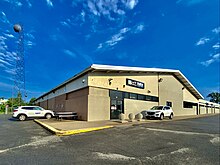WNYO-TV
While TVX Broadcast Group handled much of the station's construction, the company made another purchase that forced it to sell the unbuilt WNYB-TV to remain under national ownership limits.
[8] In 1979, interest coalesced again around channel 49, with applicants investigating the possibility of building a station to broadcast subscription television (STV) programming to paying customers.
[11] A group of California investors doing business as the Great Erie County Telecasting Corporation made its application in October,[12] followed by Channel 49 Buffalo Television, owned by an investor consortium from Baltimore,[13] the minority-owned Unific Broadcasting Company, and Bison City Television 49, whose principals were primarily from St.
[17] While Unific believed its local ownership and proposal to feature programming for the Black community in Buffalo made it a superior applicant,[18] administrative law judge Walter C. Miller selected Bison City over Unific; the primary reason was that the latter company had asked for four amendments to its financial qualifications due to an inability to secure financing.
[20] In 1985, the station secured a tower site in Colden over the objections of some local residents,[21][22] and Bison City engaged the services of Media Central of Chattanooga, Tennessee, to build the facilities on its behalf, with the call sign WNYB-TV selected.
[25] In May 1987, TVX reached a deal to sell WNYB-TV to a subsidiary of the First Allied Corporation, owned by Malcolm Glazer of Rochester.
[27] Needing to dispose of a ready-to-operate television station, TVX reportedly approached the Buffalo Sabres, the city's National Hockey League (NHL) franchise, among other groups.
[30][31] Even though Citadel Communications, owner of competing independent WUTV, alleged that Robert E. Rich Jr.'s minority ownership in the Sabres and two Buffalo radio stations violated cross-ownership rules,[32] the FCC discarded Citadel's complaint and approved the transfer to Aud Enterprises on September 1, 1987.
[35] In addition to syndicated reruns and movies, as well as the Sabres, WNYB-TV aired broadcasts of Buffalo Bisons minor-league baseball games.
Channel 29 believed this caused unnecessary duplication because of the proximity of Hamilton to Buffalo and CHCH's presence on Buffalo-area cable systems.
Additionally, CHCH was able to invoke simultaneous substitution of WUTV during Fox programs it carried, cutting into channel 29's ability to sell advertising to its large Canadian audience.
Fox moved its programming to WNYB-TV effective September 1, 1989; it did not have the Canadian cable carriage of WUTV and did not depend financially on advertising revenue from Canada.
[41] Act III had pulled off a similar station consolidation the year before in Richmond, Virginia, when it bought WRLH-TV as well as the programming inventory of competitor WVRN-TV, which then shut down.
[42] On August 29, 1989, Act III announced that it would buy WUTV along with WNYB-TV's programming and Fox affiliation, which would move to channel 29.
Simultaneously, the Sabres announced that channel 49's transmitting facility would be sold to Tri-State Christian Television (TCT) of Marion, Illinois.
Act III argued that the Buffalo market could not support what were essentially two independent stations[a] due to its "fiercely competitive nature" and the difficulties of UHF broadcasting.
[48] The structure of the purchase of WNYB-TV by TCT incentivized Tri-State Christian Television to continue the station as a non-profit for five years by including a series of sliding scale payments to the Sabres that increased if the station began accepting commercial advertising or was sold to a commercial broadcaster.
The Sabres had made the deal in part because the station had hoped to be added to southern Ontario cable systems beginning in January 1998.
[63] In 2003, WNYO-TV announced it would begin airing a 10 p.m. local newscast utilizing Sinclair's hybrid News Central format; a local anchor read stories from Buffalo, while national news and weather were provided from Sinclair's corporate office in Hunt Valley, Maryland.
[66] In January 2006, Sinclair ended its standalone news operation at WPGH-TV in Pittsburgh and triggered speculation about the future of the WNYO-TV newscast.
